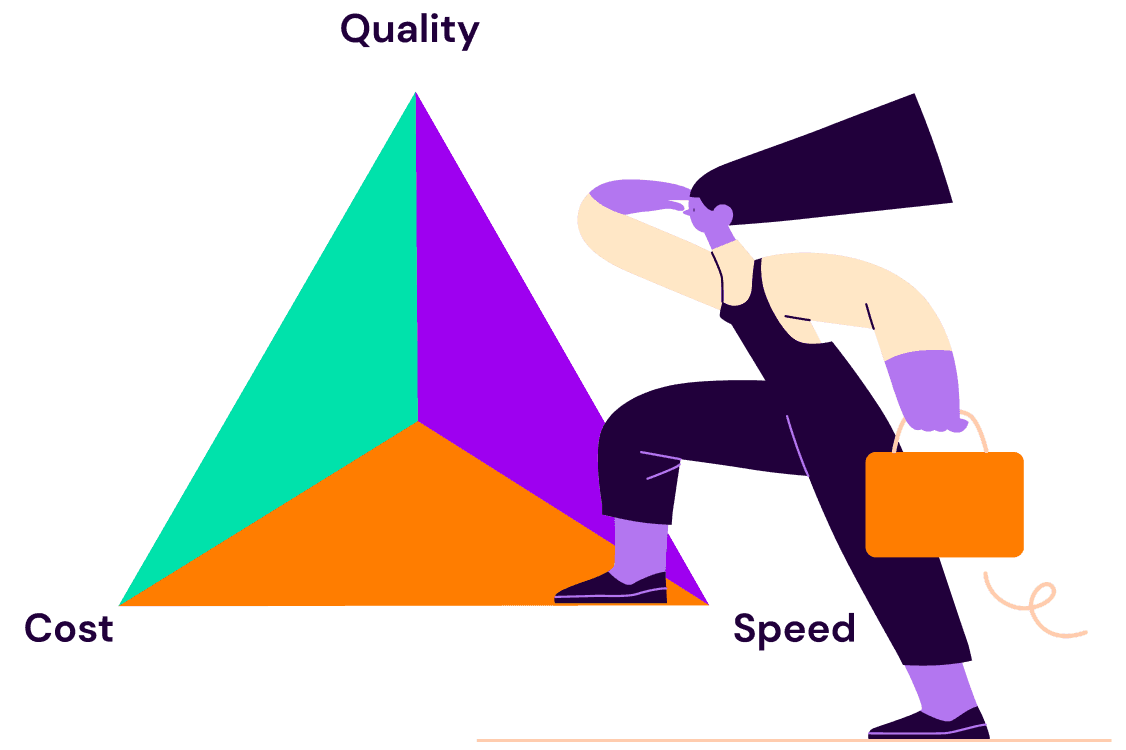
Back to blogs
Every organization has a different approach to interviewing employees for open roles. Generally, it can be a relaxed process because of the established rapport between the candidate and the company. This relationship should influence the list of interview questions for internal candidates that you gather, and it will look a little different from those you might ask other applicants.
Ahead, we’ve put together 15 interview questions for an internal candidate that focus on the employee’s career aspirations, how they exemplify company values, and how their experience at the company has prepared them for this new role.
Tips: Before interviewing internal candidates
Prior to the internal candidate interview, we recommend checking off these tasks to help you prepare.
Connect with their manager. The manager has direct insight into the candidate’s quality of work and team rapport that you can ask about.
Have a casual chat with the candidate if you’re the hiring manager. The candidate is already working in your organization, so setting up a quick sync on your calendars will be easy. Think of this as an informal interview where you can learn if the candidate’s career aspirations align with the open role. You can also ask a variation of any of the 15 questions below to get a better sense of who they are and what they might accomplish.
Source interview questions you’d ask external candidates, too. Traditional external interview questions also apply to internal candidates. Reference this list of strategic interview questions to ask candidates to create a well-rounded question bank you can reach into.
Motivational interview questions for internal candidates
The following questions offer a way for you to learn about the candidate’s drive to interview for this new role, how they’ll grow into the role, and their contributions so far at the organization.
1. Why are you interested in making this change in your career?
You’ll learn how much research they’ve done about the new role and whether they understand how it fits into their long-term career plan. If you’re having an informal chat with them, this question can be used as an educational opportunity if they’re simply exploring their options.
2. What work brings you energy and what feels like a chore?
This question is a great way to look out for the candidate. Their day-to-day workload will help you identify any adjacent or transferable skills to the new role. This question also allows you to give them a heads-up if the role requires any work they may not enjoy.
3. How do you believe your growth here has prepared you for this role?
The internal candidate should have an awareness of how they’ve grown professionally over their time at the organization. The skills and knowledge they’ve developed about the business, product or service, and culture of the company will help them seamlessly ramp up in this new role.
4. What do you think sets you apart from external candidates who are interviewing for this role?
If other candidates are being considered for the role, the internal candidate may be going up against people who have more experience or could bring fresh perspectives. The candidate should be able to express how their knowledge of the business, alignment with company culture, and relationships with other team members puts them at the top of the consideration pile.
5. What challenges could you face in this new role and how would you work through them?
You’ll get an understanding of the candidate’s awareness about the issues they could come up against when jumping into the new job. Whether it would be their first time as a people manager or they’d be starting a different career, the sooner they can identify potential challenges, the more prepared they can be to work through them independently and with their future supervisor.
Behavioral interview questions for internal candidates
Behavioral questions are an effective way to learn how a candidate would react to real-life work situations. In the case of an internal candidate, they have an opportunity to give you direct examples from working at the business. Gather insight from their manager about specific work and projects, but it’s just as helpful to hear directly from the candidate so you can assess their critical thinking and problem-solving skills.
6. Tell me about a time when you had to get a project or initiative done with limited resources.
If limited resources are the norm at your organization, this question shows how the candidate will tackle the inevitable challenge. They should be able to communicate how they approached the project or initiative, the challenges posed by the limited resources, and what they would have done differently.
7. Tell me about a time you took on work outside your comfort zone.
Teams everywhere are taking on new tasks thanks to reduced headcount and budget cuts. If this is the reality at your company, this question can help you understand how the candidate will respond to the likelihood of taking on unfamiliar work or an expanded scope of work.
8. I heard you worked on project ____. Tell me about the process and whether you’ve applied any lessons learned to other projects.
Much like the second question on this list, this one will give you a thorough glimpse of the scope of their existing work and how their approach from start to finish could benefit projects in the new role.
9. Tell me about a time when you didn’t have enough data to make the right decision.
If you work in a fast-paced industry, this question can be especially helpful in learning how they navigate ambiguity or approach challenges without a clear path forward. They should be able to walk you through how they approached this situation, including what they did and how they got to that conclusion. You can also ask about whether the decision they made turned out to be the right one and if they would have done anything differently.
10. Can you share an example of how you work cross-departmentally to build personal relationships?
You’ll get a great sense of how they’ve developed interpersonal relationships with people across the organization, how they approach establishing new relationships, and how they might apply these approaches to the new team they join.
11. Share an example of when you put company goals ahead of personal interest
Putting company goals ahead of personal interest shows the candidate’s commitment to prioritizing the organization's success over their own motives. You’ll learn how their personal goals align with the broader company vision, their ethics, and their approach to teamwork.
Management interview questions for internal candidates
If the candidate is interviewing for a managerial position, these questions could help you understand their leadership style and how they could nurture their direct reports. Adjust these questions as needed for first-time managers (e.g., how would you...).
12. In your experience, what’s been the key to developing a high-performing team?
The examples they share with you can either come from their experience as a manager or their experience as part of a high-performing team and how they intend to reflect the strategies their own manager displayed.
13. Tell me about a time when you were able to remove a barrier that prevented your team from making progress.
The candidate should detail the barrier, why it impeded progress, and the steps they took to get rid of it.
14. Tell me about a time when you provided coaching for a remote team member
Remote teams are common in today’s workforce, so it’s important to understand how the candidate will help their direct reports develop their careers or provide support without the benefit of in-person time together. This question can be adjusted to apply to in-person teams to learn the candidate’s style of coaching.
15. Share an example of a time when you challenged your team to brainstorm a solution to a shared problem.
They should communicate what drove the request, how they helped lead the team to the solution, and whether the result was effective in solving the problem.
Benefits of internal hiring
Ideally, internal mobility practices should be a part of your greater talent strategy. The benefits extend past the employee to greatly impact the sustainability of the business. Studies show that internal hires are more loyal, have improved retention, and 75% succeed in their new role.
Saves hiring costs. External hires cost 18% more than internal hires are 21% more likely to leave within the first year.
Accelerate innovation. Internal candidates have built deep knowledge of your business, the product or service, and may have already developed relationships cross-departmentally.
Improve employee retention. According to a survey by PwC, nearly 70% of workers say that skills growth is an important factor in their decision to stay with their existing employer. It’s safe to say that if employees don’t feel supported by their employers, they’ll take their talent elsewhere.
Enables agility when business strategy changes. The constant demand of market changes pressure businesses to adapt quickly. When internal talent can be moved into new roles as needed, company goals aren’t interrupted.
Learn more about the benefits of internal mobility strategies to keep your best talent and grow your business by reading Keep Your Best Talent: 7 Strategies to Drive Internal Mobility.
See us in action
Learn how SeekOut unifies people data to help organizations reach their talent goals
Request a demo




